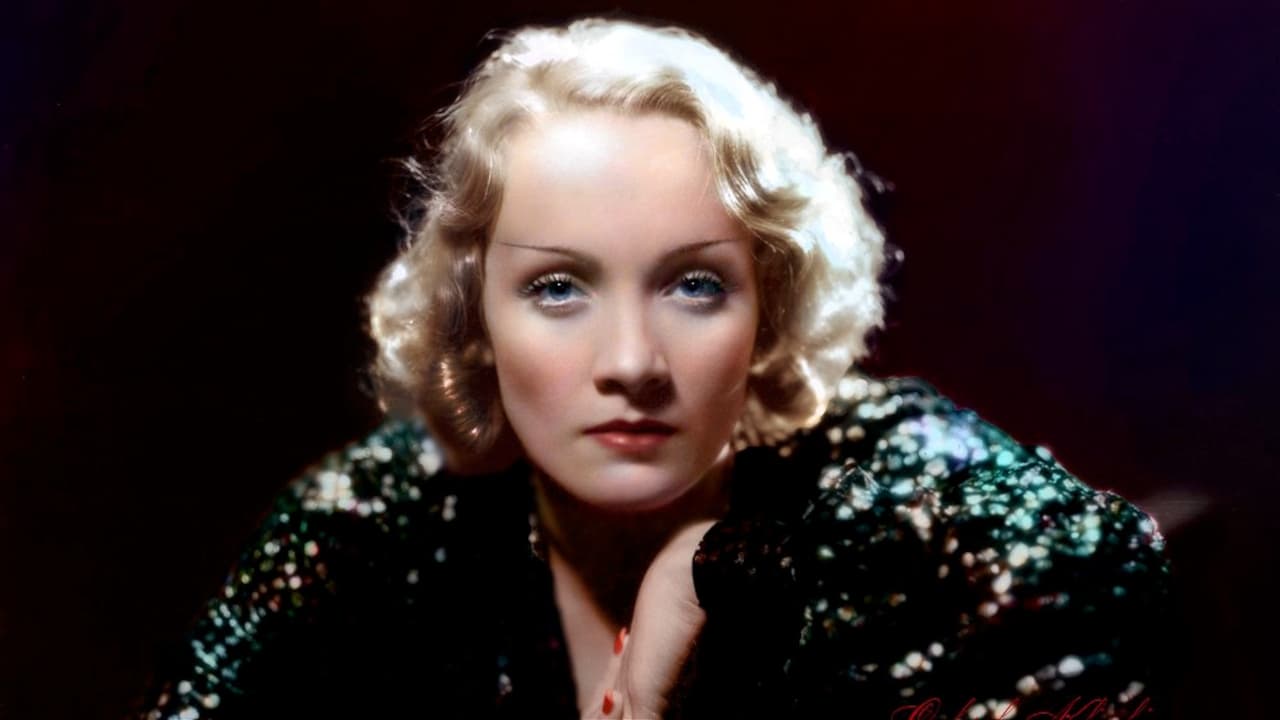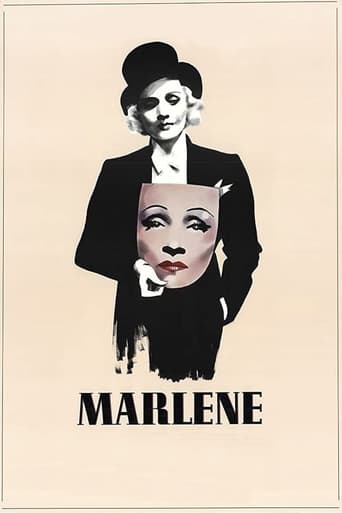

For me it's this simple: the clips from Dietrich's movies are great. They are hard not to love, all of them in different ways. And the clips from documentary footage are moving, too, and make sense in putting her life in order.But the insinuation of the director, the interviewer, into her life, and into her emotional state, is damaging both to the film and to the subject. Yes, there are little moments when Dietrich says things that seem to be truthful, and seem to actually matter. But there are a very few seconds or minutes of the whole. Much of the film has Schell cajoling and annoying the poor woman.At first you think Dietrich is just posturing and full of herself, saying how she isn't interested in digging up her past. But as it goes you realize how right she must be, and how appropriate (especially with such an up and down life, with WWII in the middle of it). But Schell just keeps pushing with his hautiness, as if we the viewers appreciate his relentlessness.I did not. It left a terrible taste in my mouth, and I for one want to be a "dreamer" and enjoy both the real woman, whatever she was willing to show of her, and the star, which we know from her movies. This documentary does little for either side of her life. It's mostly about the ambitions of a comparatively small person, the director Max Schell.
... View More"You won't believe it but the lady is extremely funny" (Maximilian Schell on Marlene Dietrich) September 1982, the Paris apartment of Marlene Dietrich...contracted for "40 hours of talking," the 81 year-old movie star at last agreed to take part in the documentary about her phenomenon. Mixed feelings, various expectations, surprises or disappointments: contradictory emotions turn up in viewers of this! Ms Dietrich reluctantly talks to Maximilian Schell, the most successful actor of German background in Hollywood. The two know each other thanks to their collaboration in the historic JUDGEMENT OF NUREMBERG 21 years earlier under the direction of Billy Wilder. Both became the expiating conscience for the post war period in motion picture industry. And both Marlene and Maximilian know that. Yet, after all these years, what pays off is getting to know the legendary movie star and encourage her to talk about MARLENE naturally. At this point she is too modest, aging, reclusive, very much to the point in her answers and too practical to praise her own heyday. Just talk. However, it appears that this little may appear too much for a great movie star. If people expect Ms Dietrich to reveal much of herself, they had better put aside this illusion. Nevertheless, among many of the documentaries, MARLENE stands on its own being a must see for her fans. Why? Because of its wonderfully specific style! As a matter of fact, all the aspects that have been criticized about the movie are its main pluses. Critical viewers are usually too much closed within the world of 'clear, linear presentation.' When something sophisticated comes, they tend to misinterpret. Soon we realize that it is not a conventional documentary about a celebrity but an absorbing chain of interaction, sometimes contradictory, impolite, absurd, quarrelsome interaction seemingly unendurable for an ordinary 'watcher.' It is all like a puzzle of hardly any information and viewers may easily be confused where the talks lead us. But isn't every human being a sort of puzzle which may only be harmed by 'conventions?' Considering Marlene's undeniably strong personality, along with the director Maximilian Schell, we try to figure out the personality, the phenomenon of the silver screen star who obstinately does not let anyone into her private life which has always been, as she puts it, 'completely separated from her professional life.' This time, she deliberately fails to do what the director says. The fact we do not see their faces but only hear their voices supplies us with inevitable imagination and empathy. To a greater extent, we are with Mr. Schell whose pursuits and patience influence us and make us look forward to the climactic encounter with the star's personality. Despite its chaotic moments and highly unconventional style of a documentary, the whole puzzle becomes meaningful only with the patience of the director and the patience of the viewers. Therefore, MARLENE meets such radical and extreme impressions. Here Ms Dietrich is hardly clear to understand, a hardly likable creature who smiles at everyone, accepts every view and nods like a politically correct 'parrot' She is not 'exciting' forget it! (that is not what she was contracted to be). She is honest about the hard work that the 'snotty kid' inevitably needed for the success; she is no dreamer with sentimental, 'kitschy' feelings; she is not fond of past; she is no 'amateur improviser' but a very practical woman who seems to have known the business as hardly anyone has. Most importantly, she is herself at the grave of her career and the twilight of her life...still before... revealing to us the timelessly high standards in art and style.That is why, Schell's MARLENE being least conventional makes it a documentary she truly deserved (paradoxically so reluctant from her side). But let me highlight one more thing that appears of highest importance when you see this documentary. That is Ms Dietrich's striking modesty and practical attitude when she reacts to Schell's 'comments' on her films and certain scenes.Alfred Hitchcock, having worked with Marlene Dietrich on his STAGE FRIGHT, said a very simple, yet an extremely meaning sentence about her: "She is a professional." Here lies the key to understanding her persona. Although she is sometimes so pretentious while talking to Mr. Schell, her ideas are deeply rooted in her very professional attitude. She is not happy about being shown the things she had done. Consider her notes on certain people she had collaborated with, in particular Orson Welles, Burt Bacharach, Fritz Lang and, foremost, Josef Von Sternberg. Moreover, her 'interpretation' of the scenes she had played, including the ones in MOROCCO, DISHONEST and THE SCARLETT EMPRESS are purely constructive and objective with the healthy distance and criticism. With this true professionalism comes her modesty: "I was an actress. I made films. Period." Elsewhere, she denies her sex appeal and erotic magnetism evoked in certain films. Enigmatic?...Complexed?....Reclusive?....Sad? ...."...I meant no harm!" We meant no harm! Our curiosity has led us all to a dangerous spot, to the encounter with melancholy and emotions. Nevertheless, Ferdiand Freiligrath's poem allows us all for a genuine tear, something all human beings, no matter if great cinema stars or simple viewers, deserve. A moment of Human Phenomenon for humans who should 'love as long as love they can.' No 'blind idolatry' but a very realistic glimpse of Marlene who had her significant moment in the cinema history and won world acclaim. 8/10
... View MoreBeing a fan of Marlene Dietrich's films, I was very anxious to see this "documentary." I also got sucked in by reading rave review after rave review from the national critics. That should have tipped me off.The movie is just plain boring and obviously extremely overrated. You don't even see Dietrich. She is heard in the background, discussing her movies and this video. She does almost nothing but complain about everything. What a drag! The filmmaker, Maximilian Schell, constantly complains himself and pleads with her to be on camera.....all to no avail. She just keeps refusing to cooperate. After awhile, this sort of thing gets really tiring. With her attitude, why would Schell continue with this project? He should have just told the prima donna to "shove it."Regardless of what you read, do not waste your time with this.
... View MoreHighlights of this brilliant documentary film must include Deitrich's opinions of directors she worked with. For example Orson Welles was a genius (`Cross yourself before you mention his name'!) She appeared in `Touch of Evil' without a fee when Welles couldn't raise finance. Von Sternberg always made things difficult for her so that she would use her brain and learn something whereas Fritz Lang was a `monster' who had her marks chalked on the floor when she arrived on set but his stride was much longer than hers. Then there's the controversy of Billy Wilder denying Marlene an Oscar opportunity for her superb performance in `Witness for the Prosecution'`Marlene' includes generous extracts from many of her movies from the silent era in Germany to her final role in `Just a Gigolo' with many gems in between. Deitrich claims never to have watched her own films but director Schell runs excerpts on a video machine and gets her comments.She also talks about her contribution to the Allied war effort, the desire of the German people for strong leadership and her contempt for Hitler.Schell & Deitrich, who appeared together in ` Judgement at Nuremberg' often disagree sharply, and listening to Marlene hold her end up in the exchanges it's easy to forget that she was 82 years old when this documentary was made in 1983.Summing up, `Marlene' is a must-see for anyone interested in older movies and her rendition of `See what the boys in the back-room will have' from `Destry Rides Again' alone is worth the money.
... View More